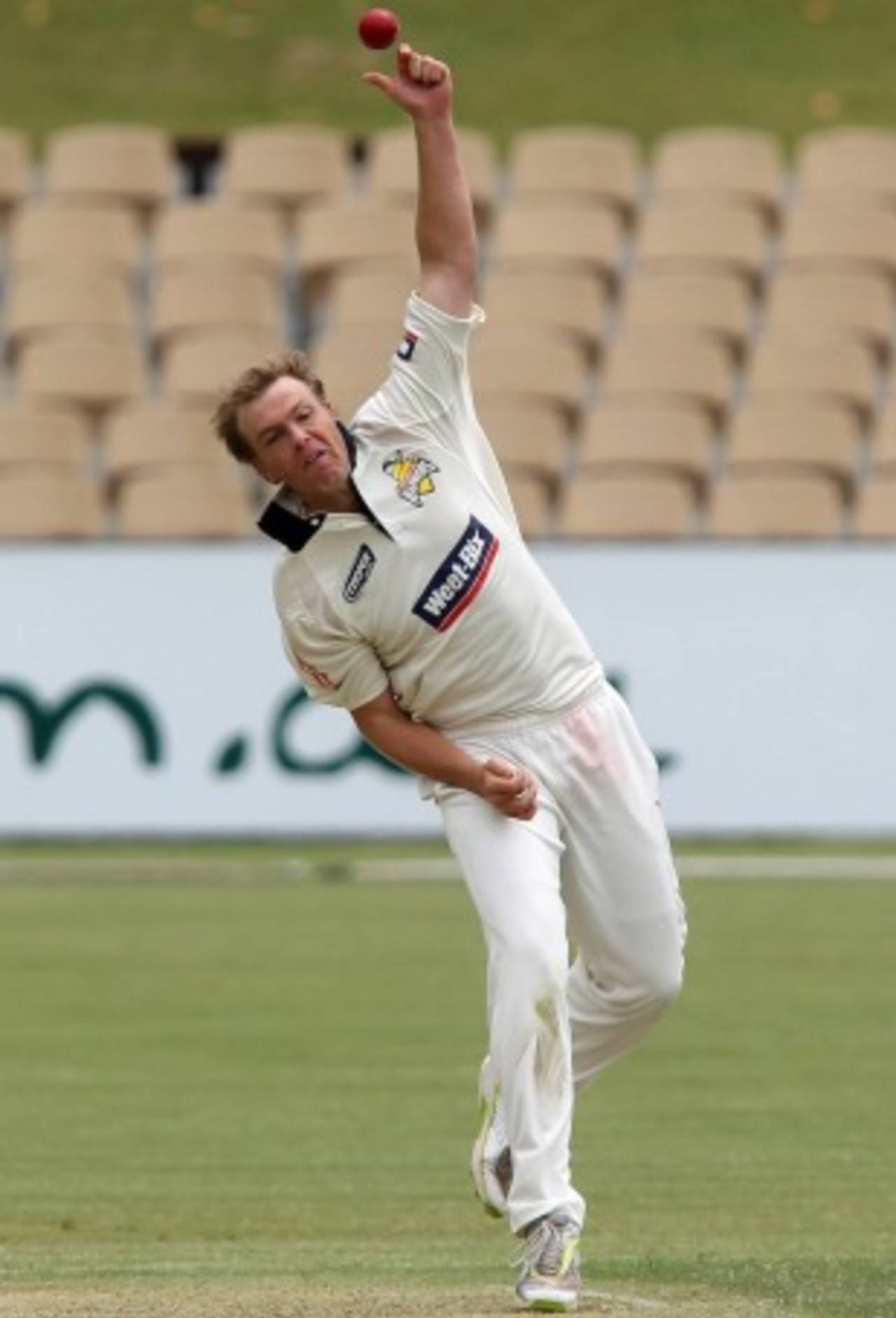Australia desperate, but Beer not the answer
The selection of Michael Beer makes little sense, for he is neither a local with vast experience of the WACA, nor the best spinner in the country
Brydon Coverdale
Dec 10, 2010, 8:38 AM

Michael Beer had not even played first-class cricket until October • Getty Images
There was more than a whiff of desperation in Australia's selection of Michael Beer for the Perth Test. And although the suggestion that Shane Warne should come out of retirement is fanciful, Warne's fingerprints are all over the strange choice of Beer, whom he recommended in his Telegraph column on Wednesday, and who, like Warne, also learnt his game in grade cricket with the Melbourne club, St Kilda.
If Beer plays, he'll be the tenth Australian Test spinner since the retirement of Warne. Chances are Beer will be capped, shipped off the production line and lapped up by England batsmen still thirsty for more runs. Or maybe he'll be put on ice before Perth, which would be a far more sensible option.
Three weeks ago, the only beer anyone would have expected to see in Australia's dressing rooms was the cases of bitter provided by the sponsors on the final day. Nathan Hauritz was the Test incumbent, Steve O'Keefe and Steven Smith were playing for Australia A, and Xavier Doherty was still to enter the picture.
Now, Doherty has been tried and discarded, Hauritz has been wrongly ignored despite strong state form, and the left-arm orthodox O'Keefe, despite bowling well against England for Australia A and being a good lower-order batsman, has fallen out of the mix. Had Warne not suggested Beer, would he even have been considered?
Which raises the question, how much does Warne know about Beer? In his column, Warne wrote that "maybe you get a local guy who knows the Perth conditions", yet as Beer's St Kilda roots suggest, he is about as local to Western Australia as Warne.
Beer moved to Perth less than a year ago and has played only three first-class games at the WACA, where the sea breeze can help or hinder spinners with equal measure. In his most recent match there, Beer took match figures of 3 for 139 against New South Wales, whose rejected Australian spinner, Hauritz, collected 7 for 104.
Maybe the selectors have seen something special from Beer, like when Peter Taylor was plucked from obscurity 24 years ago and bowled Australia to victory in an Ashes Test at the SCG. But is this the same "something special" they have seen in Beau Casson, Cameron White, Jason Krejza, Doherty and others over the past three years?
When they are choosing a spinner, the selectors seem not to ask who is the best slow bowler in the country, but rather "who haven't we tried yet?" O'Keefe, Cameron Boyce, Jon Holland, Aaron O'Brien and Cullen Bailey should probably keep their phones handy over the next few months. Perhaps they simply wanted someone to keep the pressure on Smith, who is also in the 12-man squad and is certain to play at the WACA.
Smith must be in the XI because Marcus North has been dropped, and no other batsman was picked. Brad Haddin has been in strong enough form to move up to No. 6 with Smith as an all-round option at No. 7. It's a brave selection, and Smith should add some spark to the side - in the field and with the bat, while being a serviceable bowling option.
North's up-and-down form meant he had to go; a No. 6 who cannot be relied upon in tough circumstances is no man for an Ashes campaign. Callum Ferguson can consider himself unlucky to have been overlooked having scored 131 in the Sheffield Shield on the day the squad was announced, his second hundred in three games this summer.
The inclusion of Smith leaves the selectors to choose between a four-man pace attack, or three fast bowlers with Beer as a second spinner. And for all Smith's flaws as a bowler, it makes no sense to play both him and Beer at the WACA. Ben Hilfenhaus, Ryan Harris, Peter Siddle and Mitchell Johnson, who can slide back in as a fourth fast man used in short, sharp spells, is the way to go.
Doug Bollinger's fitness is an issue, as well as his poor form at Adelaide Oval, and like Doherty and North, his axing was justified. The easiest decision was to bring in Phillip Hughes to replace the injured Simon Katich, despite Hughes being found out against the short ball in England last year, and making scores of 4 and 0 for against South Australia in the recently concluded match at the SCG.
He may not be in career-best form, but nor are any of the other openers in state cricket. Choosing anyone but Hughes would have sent another message of desperation, and one such whiff was enough in this squad.
Brydon Coverdale is an assistant editor at Cricinfo